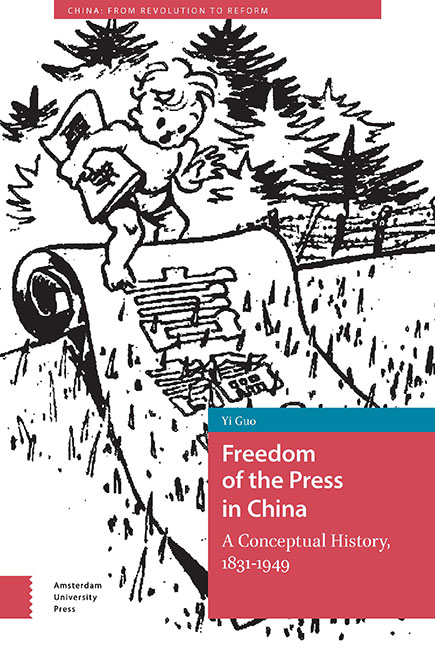Book contents
- Frontmater
- Contents
- A Note on Romanization
- Acknowledgements
- Foreword
- Introduction
- 1 The Enlightenment of the West
- 2 Chuban Ziyou: The Invention of a Neologism
- 3 The Liminal Landscape
- 4 The Intellectual Legacy of Sun Yat-sen
- 5 The Empty Phrase and Popular Ignorance
- 6 Conceptual Debates in the 1920s and 1930s
- 7 The Last Call for Press Freedom
- Conclusion
- Bibliography
- Index
6 - Conceptual Debates in the 1920s and 1930s
Published online by Cambridge University Press: 20 November 2020
- Frontmater
- Contents
- A Note on Romanization
- Acknowledgements
- Foreword
- Introduction
- 1 The Enlightenment of the West
- 2 Chuban Ziyou: The Invention of a Neologism
- 3 The Liminal Landscape
- 4 The Intellectual Legacy of Sun Yat-sen
- 5 The Empty Phrase and Popular Ignorance
- 6 Conceptual Debates in the 1920s and 1930s
- 7 The Last Call for Press Freedom
- Conclusion
- Bibliography
- Index
Summary
Abstract
Many overseas Chinese graduates returned to China after the establishment of the new republic by the Nationalists in 1912. They found that they had to re-evaluate their Western experiences and values from a perspective based on this new Chinese context. With regards to press freedom, individual circumstances and preferences resulted in divergent conceptions of press freedom. This chapter elaborates on these different attitudes towards press freedom amongst the more educated class in the 1920s and the 1930s. Debates were centred on two issues – ‘people's right versus human rights’, and ‘freedom versus limitation’. It shows that contested interpretations were based on the different socio-cultural backgrounds and personal selections of the concerned parties.
Keywords: New Culture Movement, absolute freedom, Marxism, political tutelage, press censorship, Chinese resistance war
A large number of overseas Chinese graduates returned to China after the establishment of the new republic, and many of them had obtained master's or doctoral degrees from prestigious international universities. The new republican government provided them with tempting job opportunities. The majority of these returning graduates were immediately hired as civil servants and participated in the routine operation of government. Others were hired as educators working in tertiary and secondary education institutions. These people, as well as their students who would graduate from domestic universities, were the intellectual elite who existed as the third power between the official ideology (the Three Principles of the People) and the general population who had little understanding of press freedom. They were a group of people who had experienced life in the West and had some knowledge of Western theories, and most of them were sympathetic to and enthusiastic about Western values and lifestyles.
After returning to their home country, however, particularly as many of them began serving in the Nationalist government, they had to re-evaluate their Western experiences and values from a perspective based on the new Chinese context. For each person this reevaluation was different, of course, resulting in divergent conceptions of press freedom amongst these intellectual elite. Nonetheless, their interpretations and understandings are key to understanding the history of press freedom in China.
- Type
- Chapter
- Information
- Freedom of the Press in ChinaA Conceptual History, 1831–1949, pp. 161 - 190Publisher: Amsterdam University PressPrint publication year: 2020



